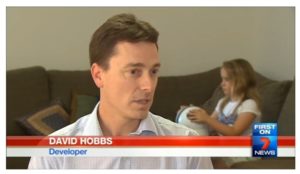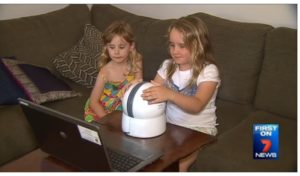Click here to watch 7 News Adelaide coverage.
Let’s face it, computer games are a very common device for children to play, engage and interact with. You regularly hear from parents about how difficult it can be to pull their children away from the Xbox or the PlayStation.
And as we begin the South Australian summer school holidays, children around the State will be enjoying play dates with their friends with their computer consoles.
But what about those children with CP who find it difficult, often impossible, to grip a video game controller or have the dexterity to push the buttons to navigate the games? Why should they miss out on these ‘rights of passage’ and memories with their siblings and friends? Why should they miss out on the fun?
With approximately 17 million people across the globe living with cerebral palsy (CP), it the most common physical disability in childhood that affects movement and has no known cure.
Flinders University Rehabilitation Engineer Mr David Hobbs, is working hard to bring new hope to the children and families of children living with CP.
Recognising the importance of technology, Mr Hobbs has been investigating whether children with CP can improve their sense of touch by playing a purpose-build, interactive computer gaming system.
Through his research, Mr Hobbs has developed an award-winning accessible gaming system and novel controller named ‘Orby’, together with 15 custom-build computer games, designed to encourage hand use and movement of the controller but not focus on the use of buttons. The research is a collaborative project between Flinders University, the University of South Australia and the Women’s and Children’s Hospital.
In a world-first study led by the Flinders University Rehabilitation Engineer, families have been invited to trial ‘Orby’, to explore the benefits of using ‘haptic’ gaming to restore tactile sensory loss.
“’Orby’ has been developed around some detailed design specifications. We wanted to create a tool for everybody to be able to engage in gaming, but also see if we can bring about a change in behaviour, using the controller as a rehabilitation tool, but in a fun, engaging way”, said Mr Hobbs.
“What we found was not only was Orby incredibly easy to use for every participant, but Orby was changing the way these children participated and interacted with their siblings and families”, said Mr Hobbs.
“Orby became an adopted member of some of these families, reinforcing social skills like sharing and communication”, said Mr Hobbs. “Siblings who couldn’t play the same games before have been able to share game secrets and try and beat each other’s score. It has truly been heart-warming to see the impact on families”.
One teenager with cerebral palsy who tested the games before Mr Hobbs’ trial started said, “I had the best 2 weeks of my life playing the games”.
So what can we take away from this study? Technology is an untapped resource for many children with CP and helping families to discover new ways to improve their child’s participation levels and quality of life is important.
This study was made possible through funding from the Women’s and Children’s Hospital Foundation and the Channel 7 Children’s Research Foundation.
One of the priority areas of Flinders University’s Medical Device Research Institute is to work with end user’s to design and develop innovative technologies to meet the needs of people with a disability and to make them commercially accessible.
Mr Hobbs and his team are currently looking at new research opportunities with other populations to see if the system can benefit and improve rehabilitation outcomes for people recovering from stroke and those with Parkinson’s disease.
“Whilst we are very appreciative of the support we have received to carry out this study, in many ways we have really just scraped the surface of what we can do, and further support would help us achieve our goal of improving the system and making it available to everyone”.
The team is currently pursuing commercial avenues and talking with companies who are keen to support and develop the system to realise this goal.
If you would like to find out more about the study or about ‘Orby’, please contact:
Mr David Hobbs, ph (08) 8201 3167 or E: david.hobbs@flinders.edu.au
For commercial enquiries and interest, please contact:
Mr Mark Bruce, ph (08) 8201 5804 / 0433 785 787 or E: mark.bruce@flinderspartners.com



